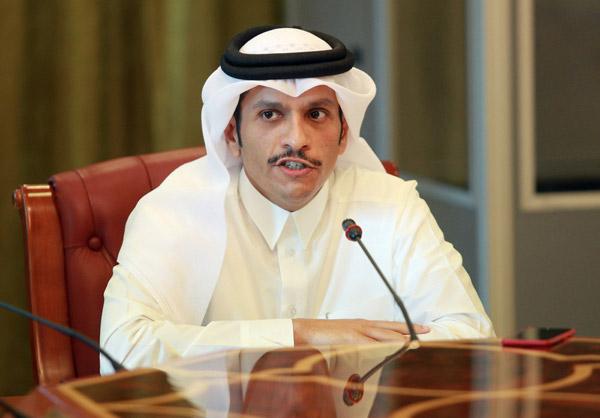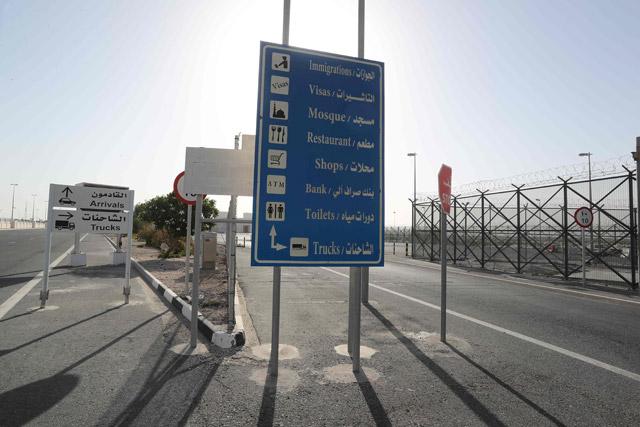You are here
Defiant Qatar rejects interference as crisis grows
By AFP - Jun 09,2017 - Last updated at Jun 09,2017

Qatar’s Foreign Minister Sheikh Mohammed Bin Abdulrahman Al Thani speaks to reporters in Doha, Qatar, on Thursday (Reuters photo)
DOHA — Qatar’s foreign minister rejected attempts to interfere in the country’s foreign policy on Thursday, defying calls from the emirate’s Gulf neighbours despite an escalating crisis.
In an interview with AFP, Sheikh Mohammed Bin Abdulrahman Al Thani said calls for a change in Qatari policy from Saudi Arabia and its allies, which cut diplomatic ties with Doha this week, were unacceptable.
“No one has the right to intervene in our foreign policy,” Sheikh Mohammed said.
He also rejected “a military solution as an option” to resolving the crisis, and said Qatar could survive “forever” despite the measures taken against it.
The sheikh’s remarks came as efforts intensified to resolve the feud pitting Saudi Arabia and allied Arab nations against Qatar.
As Kuwait’s emir shuttled between Gulf capitals for talks, US President Donald Trump offered to host a White House meeting if necessary, in a change of heart from his initial support for the Saudi-led boycott.
Saudi Arabia, the United Arab Emirates, Egypt and Bahrain lead a string of countries that this week cut ties with Qatar over what they say is the emirate’s financing of extremist groups and its ties to Iran, Saudi Arabia’s regional arch-rival.
Qatar strongly denies the allegations and has expressed a willingness to engage in talks to resolve the crisis.
Kuwait emir leads efforts
The Arab countries closed air, sea and land links with Qatar, barred the emirate’s planes from their airspace and ordered Qatari citizens out within 14 days.
The feud has raised fears of wider instability in an already volatile region that is a crucial global energy supplier and home to several Western military bases.
Kuwait — which unlike most of its fellow Gulf Cooperation Council members has not cut off ties with Qatar — has been leading efforts to mediate.
Its emir Sheikh Sabah Al Ahmad Al Sabah held talks on Wednesday with Qatari counterpart Sheikh Tamim Bin Hamad Al Thani, following talks with senior UAE officials and Saudi King Salman.
Trump, who had initially backed the measures against Qatar in a tweet, called Sheikh Tamim on Wednesday with an offer “to help the parties resolve their differences”.
Qatar hosts Al Udeid military base, the largest US airbase in the Middle East. Home to some 10,000 troops, Al Udeid is central to the US-led fight against the Daesh terror group in Iraq and Syria.
French President Emmanuel Macron has also reached out to Qatar, Saudi Arabia and Iran in a bid to kick off negotiations.
Turkey, which works closely with Qatar in the energy sector, has walked a fine line between defending Qatar and abstaining from openly antagonising Saudi Arabia.
Ankara hosted Iranian Foreign Minister Mohammad Javad Zarif this week for talks, including on Qatar.
In a sign of support for Doha, Turkey’s parliament on Wednesday approved an agreement to expand the number of troops deployed to a Turkish base in Qatar. The agreement did not detail a timeframe or the number of troops.
Iran and Qatar share the world’s largest gas field, an offshore site the Iranians call South Pars and the Qataris call the North Dome. Doha is the world’s largest exporter of natural liquefied gas.
Analysts say the crisis is in part an extension of a 2014 dispute, when Saudi Arabia, the UAE and Bahrain temporarily recalled their ambassadors from Doha over Qatari support for Egypt’s Muslim Brotherhood.
A top Gulf official, speaking on condition of anonymity, told AFP a major concern was the influence of Sheikh Tamim’s father, Sheikh Hamad, who had allowed the Taliban to open an office in Doha and helped arm Syrian rebels before abdicating in 2013.
“The previous emir is a big supporter of this whole extremist agenda, so we do have an issue,” the official said.
Foreign policy ‘gone wild’
Doha has for years forged its own alliances in the region, often diverging from the politics of the six-state GCC and taking in leaders of the Muslim Brotherhood, the Palestinian Hamas and members of the Afghan Taliban.
A senior Emirati official told AFP this week’s decision was not aimed at a change of regime in Qatar but to pressure the country to reshape its policy.
“This is a foreign policy that has gone wild,” state minister for foreign affairs Anwar Gargash told AFP. “We need to put everything in check.”
Gargash said the four Arab states seek a “political commitment to change course” by Qatar, including ending its support for the Brotherhood and Hamas.
Qatar’s satellite news giant Al Jazeera has also emerged as a point of contention in the Gulf.
Gargash said “not using the formidable media ownership in promoting an extremist agenda” was a condition for negotiations.
The UAE and Saudi Arabia have banned Al Jazeera from the airwaves and closed the channel’s offices.
Bahrain on Thursday followed the UAE in announcing that expressing sympathy for Qatar over the sanctions was an offence punishable by jail.
Related Articles
AMMAN — Jordan on Tuesday announced that it decided to reduce diplomatic representation with Qatar and revoke the licence of the Doha-based
DOHA — Qatar on Saturday denounced a sweeping list of demands from Saudi Arabia and its allies in an escalating Gulf diplomatic crisis as un
DOHA — The Gulf crisis, which has pitted regional players against Qatar, could be moving closer to resolution as the key countries prepare t













